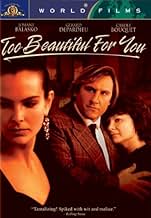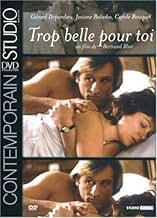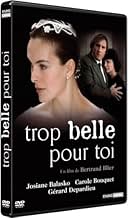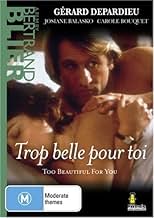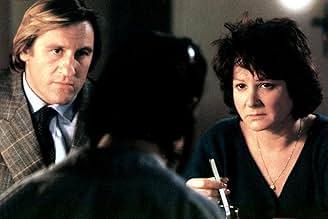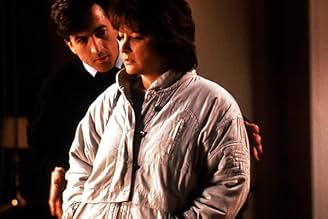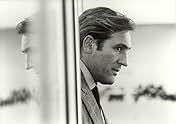IMDb रेटिंग
6.6/10
3.2 हज़ार
आपकी रेटिंग
एक अमीर व्यापारी द्वारा एक कठोर प्रेम त्रिकोण बनाया जाता है.एक अमीर व्यापारी द्वारा एक कठोर प्रेम त्रिकोण बनाया जाता है.एक अमीर व्यापारी द्वारा एक कठोर प्रेम त्रिकोण बनाया जाता है.
- पुरस्कार
- 6 जीत और कुल 7 नामांकन
Gérard Depardieu
- Bernard Barthélémy
- (as Gerard Depardieu)
Catherine Gillet
- La femme du train
- (बिना क्रेडिट के)
Sylvie Orcier
- Marie-Catherine
- (बिना क्रेडिट के)
फ़ीचर्ड समीक्षाएं
"Elle est trop belle" is a romantic drama overflowing with a refined yet vulgar sensuality that is common in French films. Sexuality, lust, infidelity are the main themes of the film, and are lusciously exhibited on screen. Choice of music was excellent, with Schubert in the background providing beauty and consolation in midst of heightened drama. You have fancy dinners, spacious mansions and country homes. Certainly men of culture will appreciate this film.
Acting in scenes was mostly naturalistic and plain, though not completely without emotion. Overall tempo of the movie was slow and relaxed, taking plenty of time to establish scenes and characters. Sometimes even bordering on boredom. Focus was not purely based on intense emotions of infatuation and cliched notions of romanticism, but the human relationships between the characters.
The unoriginality of the subject matter and the lack of subversiveness in the message, however, dims the glow of its achievements. The sudden middle-life crisis and the marital unhappiness of a well-to-do middle class couple has been well documented in the history of film, and there have been better portrayals of it. The movie is heavy-handed with its message of internal and external beauty.
There might have been some critique of the boredom of the perfect bourgeoisie life, but it is soo brief, indirect and inconsequential you could easily miss it. It seems the down-to-earth nature and vividness of Colette is contrasted with the icy and cold demeanor of the proper Florence, and the white spacious family home with the small run-down motel.
In the end, the story felt quite simple and predictable, even cliched. While watching it for the first time was a pleasant experience, there is probably little one can gain from rewatching the film. Overall, it is a decent film, doing its job well, but nothing out of the ordinary. Though I do admire the movie in other respects, the script just doesn't make it.
Acting in scenes was mostly naturalistic and plain, though not completely without emotion. Overall tempo of the movie was slow and relaxed, taking plenty of time to establish scenes and characters. Sometimes even bordering on boredom. Focus was not purely based on intense emotions of infatuation and cliched notions of romanticism, but the human relationships between the characters.
The unoriginality of the subject matter and the lack of subversiveness in the message, however, dims the glow of its achievements. The sudden middle-life crisis and the marital unhappiness of a well-to-do middle class couple has been well documented in the history of film, and there have been better portrayals of it. The movie is heavy-handed with its message of internal and external beauty.
There might have been some critique of the boredom of the perfect bourgeoisie life, but it is soo brief, indirect and inconsequential you could easily miss it. It seems the down-to-earth nature and vividness of Colette is contrasted with the icy and cold demeanor of the proper Florence, and the white spacious family home with the small run-down motel.
In the end, the story felt quite simple and predictable, even cliched. While watching it for the first time was a pleasant experience, there is probably little one can gain from rewatching the film. Overall, it is a decent film, doing its job well, but nothing out of the ordinary. Though I do admire the movie in other respects, the script just doesn't make it.
Bertrand Blier's story of love at first sight between a successful auto salesman and his older, unglamorous secretary does more than simply dispel the skin-deep myth of physical beauty. Gérard Depardieu describes his new lover as "not beautiful, but nice", but his aristocratic young wife dismisses her for being 'common', setting up a conflict not between age and beauty but between opposing social classes, with a proletarian lug who married into the upper crust becoming justifiably mushy over someone less pretentious than his wife. It sounds like fun, but anyone expecting a lightweight romantic farce will be disappointed to find something closer to an intellectual exercise in style, designed around an exaggerated sense of melodrama and several odd, operatic gestures: characters thinking out loud in public or engaging in third-person soliloquies, and so forth. Not to mention, in an obscure ongoing joke, a few outspoken criticisms of the music of Franz Schubert.
I saw "Trop Belle Pour Toi" when it was released on the art-house theatrical circuit in the U.S. 30 years ago. This film has stuck with me since that time and still feels very true to life as our culture has become even more superficial than it was in the "go-go" '80s--particularly when it comes to definitions of beauty. The plot is simple: A rough-edged, ambitious, striving man (Gerard Depardieu at the height of his international fame) has achieved great success in the auto business, and he's acquired all the "trophies" that he may have desired: the cars, the house, the lifestyle, the almost too-gorgeous, elegant, younger wife. But he develops a visceral attraction to his secretary, who is dumpy, older, physically ordinary. They begin an affair, and he finds his lover warm, comforting, engaging and sexually exciting in ways that his very beautiful wife (crisply played by Carole Bouquet) is not.
What stuck with me about this film for 30 years is the deft way the director upends the classic interpretations of what makes someone "attractive," desirable or sexy, and what makes for a really exciting sexual and romantic relationship. The film hits some very true-to-real-life notes about what drives people in their most basic appetites and desires. Depardieu gives an engaging, visceral performance as a man having a classic midlife crisis: he's bored by his marriage to the perfect woman that everyone else envies, even though she's perfectly nice and intelligent. Every time I read or hear people saying that some famous man must be crazy for cheating on his beautiful wife or that he must be blissfully happy because his wife is a famous beauty, I automatically think of this film. I plan to watch it again soon.
What stuck with me about this film for 30 years is the deft way the director upends the classic interpretations of what makes someone "attractive," desirable or sexy, and what makes for a really exciting sexual and romantic relationship. The film hits some very true-to-real-life notes about what drives people in their most basic appetites and desires. Depardieu gives an engaging, visceral performance as a man having a classic midlife crisis: he's bored by his marriage to the perfect woman that everyone else envies, even though she's perfectly nice and intelligent. Every time I read or hear people saying that some famous man must be crazy for cheating on his beautiful wife or that he must be blissfully happy because his wife is a famous beauty, I automatically think of this film. I plan to watch it again soon.
In this clever take on love and relationships, the affairs of three people are enigmatically portrayed. Everyone adores Bernard's wife Florence. His friends lust for her, her friends envy her. She is very beautiful, and for Bernard there is nothing more left to desire. And that is precisely what troubles him: she may just be too beautiful. His secretary, a temp named Colette, is completely the opposite to Florence. But in her physical unattractiveness Bernard finds a refuge to his peculiar dilemma. Despite of what may seem as a logical explanation, he is not plagued by an inferiority complex. What drives Bernard is the psychological force of the middle-age crisis. Some people wonder whether what they have is as good as it gets. Bernard actually knows that. The second he is near Florence he knows that that is true; gazes of his friends reassure him in that.
With Colette, however, he feels completely at ease. There is no need for self-assertion and he is free to choose. Naturally, there is much more to this film, which is full of surprises and unexpected events. The only country where such a complex and somewhat surrealistic plot could have been brought to life, where careful avoidance of turning the film into a soap opera, a pointless comedy, or a tedious drama meets with the bittersweet taste of love and desire is France, and the philosophy of love, the satire, and the superb acting -- Depardieu, Bouquet, and Balasko make a lovely team -- are also typically French here. Ironically enough, the question of the age is inverted to "what does a MAN want?"
With Colette, however, he feels completely at ease. There is no need for self-assertion and he is free to choose. Naturally, there is much more to this film, which is full of surprises and unexpected events. The only country where such a complex and somewhat surrealistic plot could have been brought to life, where careful avoidance of turning the film into a soap opera, a pointless comedy, or a tedious drama meets with the bittersweet taste of love and desire is France, and the philosophy of love, the satire, and the superb acting -- Depardieu, Bouquet, and Balasko make a lovely team -- are also typically French here. Ironically enough, the question of the age is inverted to "what does a MAN want?"
The few reviews here indicate that this is a film which provokes in some boredom and confusion, while other will find it provocative and daring in its originality. Maltin gives it a two-star rating and says "after a bright beginning, it goes absolutely nowhere." I was prepared to abandon the film after 15 minutes or so, but the absolutely gorgeous Schubert melodies that pervade the score and tie it all together....they kept me going with the film, and the fantastic photography, acting, and plot twists sustained my interest to the end.
Yes, the approach is surreal and the story-telling non-linear. Much of the dialog is brilliant, but it soon became obvious (to me, anyway) that these people are not actually saying these things to one another ... and what an interesting world it would be if we could say aloud all the things that we deeply feel! I cannot pretend to have understood it all, but the film had an intellectual appeal and, to repeat an earlier point, a ravishing score of Schubert pieces which adorn the film like precious jewels.
Yes, the approach is surreal and the story-telling non-linear. Much of the dialog is brilliant, but it soon became obvious (to me, anyway) that these people are not actually saying these things to one another ... and what an interesting world it would be if we could say aloud all the things that we deeply feel! I cannot pretend to have understood it all, but the film had an intellectual appeal and, to repeat an earlier point, a ravishing score of Schubert pieces which adorn the film like precious jewels.
क्या आपको पता है
- ट्रिवियाIn the documentary Blier, Leconte, Tavernier: trois vies de cinéma (2020), Blier says it was hell to shoot.
- भाव
Colette Chevassu: Beauty hurts.
- साउंडट्रैकImpromptu Opus 90 No 2
Music by Franz Schubert
Piano: Odette Gartenlaub
édition CINE VALSE - D.D. PRODUCTIONS - ORLY FILMS -S.E.D.I.F.
टॉप पसंद
रेटिंग देने के लिए साइन-इन करें और वैयक्तिकृत सुझावों के लिए वॉचलिस्ट करें
- How long is Too Beautiful for You?Alexa द्वारा संचालित
विवरण
बॉक्स ऑफ़िस
- US और कनाडा में सकल
- $17,76,440
- US और कनाडा में पहले सप्ताह में कुल कमाई
- $31,208
- 4 मार्च 1990
- दुनिया भर में सकल
- $17,76,440
- चलने की अवधि
- 1 घं 31 मि(91 min)
- ध्वनि मिश्रण
- पक्ष अनुपात
- 2.35 : 1
इस पेज में योगदान दें
किसी बदलाव का सुझाव दें या अनुपलब्ध कॉन्टेंट जोड़ें

